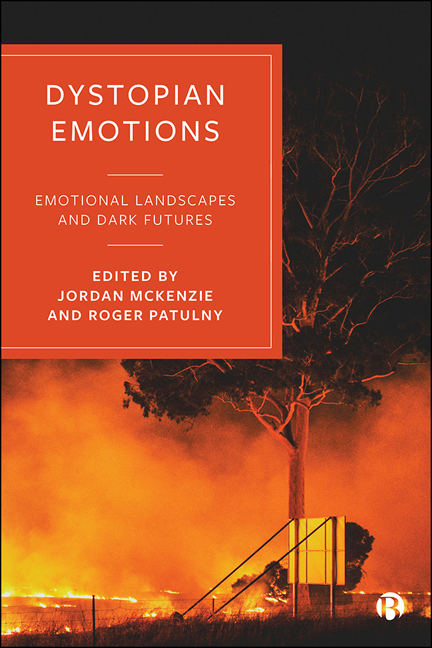Book contents
- Frontmatter
- Contents
- Notes on Contributors
- Acknowledgements
- Introduction: The Feeling of Dystopia
- 1 Borderland Emotions: A Case Study of Youths in Kinmen, Taiwan
- 2 Beyond Wicked Facebook: A Vital Materialism Perspective
- 3 Detangling Online Dystopias: Emotional Reflexivity and Cyber-Deviance
- 4 Mass Emotional Events: Rethinking Emotional Contagions after COVID-19
- 5 Between the Nationalists and the Fundamentalists, Still We Have Hope!
- 6 ‘The New Economy and the Privilege of Feeling’: Towards a Theory of Emotional Structuration
- 7 Neo-Villeiny University
- 8 Resuscitating the Past: Zygmunt Bauman’s Critical Analysis of the Recent Rise of Retrotopia
- 9 Hope Out of Stock: Critical and Melancholic Hope in Climate Fiction
- Conclusion: A Critical Mass of Emotions – Reflexivity, Loneliness and Hope?
- Index
5 - Between the Nationalists and the Fundamentalists, Still We Have Hope!
Published online by Cambridge University Press: 13 May 2022
- Frontmatter
- Contents
- Notes on Contributors
- Acknowledgements
- Introduction: The Feeling of Dystopia
- 1 Borderland Emotions: A Case Study of Youths in Kinmen, Taiwan
- 2 Beyond Wicked Facebook: A Vital Materialism Perspective
- 3 Detangling Online Dystopias: Emotional Reflexivity and Cyber-Deviance
- 4 Mass Emotional Events: Rethinking Emotional Contagions after COVID-19
- 5 Between the Nationalists and the Fundamentalists, Still We Have Hope!
- 6 ‘The New Economy and the Privilege of Feeling’: Towards a Theory of Emotional Structuration
- 7 Neo-Villeiny University
- 8 Resuscitating the Past: Zygmunt Bauman’s Critical Analysis of the Recent Rise of Retrotopia
- 9 Hope Out of Stock: Critical and Melancholic Hope in Climate Fiction
- Conclusion: A Critical Mass of Emotions – Reflexivity, Loneliness and Hope?
- Index
Summary
Introduction
In this chapter we will focus on the relationship between affect and utopian and dystopian politics in contemporary post-war Sri Lanka. We make three main claims: first, that affect plays a crucial role in Sri Lankan politics and this has been underestimated and addressed by many liberal and progressive political actors. Second, the relationship between affect and politics is both locally contextual but also not something that applies only to non-Western societies that are often treated as having ‘dysfunctional’ or ‘immature’ politics. Third, while the dominant affective landscape feeds a dystopian vision of politics, there are also forms of utopian politics that are building alternative affective communities. These alternatives highlight both the embodied and the concrete nature of utopian political action that refute the characterization of utopianism as abstract and unrealistic.
To support these arguments our chapter consists of two core parts. First, in highlighting the importance of engaging with the affective dimension of politics in contemporary Sri Lanka we seek to bring into conversation two separate bodies of literature. First, the anthropological literature that has highlighted the role that ritual and myth have played in grounding and sustaining past political violence in Sri Lanka (Tambiah, 1986; Kapferer, 1988, 2001; Spencer, 2007) and that continue to influence contemporary political discourse (Ambos, 2015; Gunatilleke, 2018). Second, the theoretical work – focused mainly on the West – that has sought to trace the role that emotion plays in politics of domination, exclusion, oppression and resistance (Connolly, 2002; Ahmed, 2004; Berlant, 2011). In the process we present an account that both expands and adds context to existing political theory that engages with emotion and helps to explain the limits of liberal and progressive political responses to Sri Lanka's past violence and more recent events like the Easter 2019 bombings and their aftermath. We trace the ways in which emotions of fear, love and hate are articulated and capitalized upon in mainstream political discourse in Sri Lanka in ways that both resonate with but are also distinct from accounts originating in the West.
In the second part of the chapter we seek to move beyond this dystopian view of politics and affect.
- Type
- Chapter
- Information
- Dystopian EmotionsEmotional Landscapes and Dark Futures, pp. 89 - 103Publisher: Bristol University PressPrint publication year: 2021

